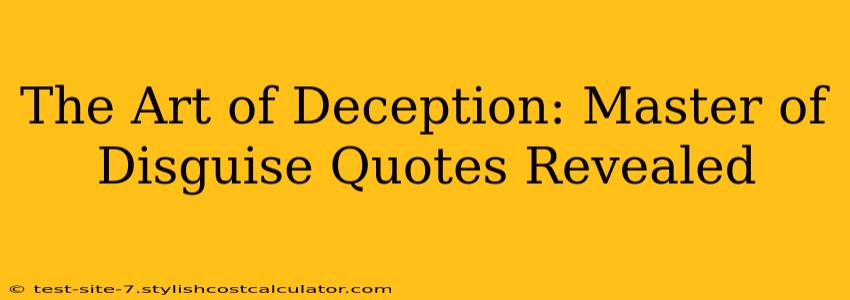The Art of Deception: Master of Disguise Quotes Revealed
The allure of disguise, the thrill of transformation, the power of deception – these are timeless themes explored across literature, film, and real life. Masterful disguises aren't just about changing clothes; they're about altering behavior, voice, mannerisms, even the very essence of one's presence. Examining quotes from fictional masters of disguise illuminates the psychology and artistry behind this captivating skill. While we won't reveal specific movie spoilers, we will delve into the underlying themes these quotes often convey.
What makes a good disguise?
A truly effective disguise isn't just about physical appearance. It's a multifaceted art that requires meticulous attention to detail and a deep understanding of human behavior. A successful disguise requires blending into the environment, adopting a believable persona, and anticipating potential detection. It's about becoming someone else entirely, not merely imitating them. This goes beyond simply changing clothes and makeup; it involves understanding the psychology of the person you are impersonating, mastering their body language and mannerisms. Even the subtlest inconsistencies can unravel the most intricate disguise.
What are some famous disguises in fiction?
Fictional characters frequently employ disguise for a variety of reasons: espionage, self-preservation, revenge, or simply intrigue. From the legendary Sherlock Holmes adopting numerous guises to infiltrate criminal circles, to the intricate and elaborate transformations in stories such as "A Thousand and One Nights," disguise has served as a powerful narrative tool throughout history. Analyzing specific examples of these fictional disguises can offer invaluable insights into the effectiveness of different techniques and the potential pitfalls to avoid.
Are there any real-life examples of masterful disguises?
While fictional characters often employ dramatic and improbable disguises, real-life examples are equally fascinating, albeit frequently less sensationalized. Historical figures and notorious criminals have utilized disguise for their own ends, demonstrating the power of deception in the real world. However, the very nature of successful real-life disguises often means they remain largely unknown, highlighting the effectiveness of these covert operations.
How can I improve my disguise skills?
While mastering the art of disguise like a fictional master spy may be improbable, understanding the underlying principles can be surprisingly useful in various contexts. This skill isn't just about espionage; it extends to public speaking, job interviews, and even everyday social interactions. Improving observation skills, understanding body language, and practicing adaptability are key aspects of improving one's ability to blend in and adopt different personas.
What are some common mistakes people make when trying to disguise themselves?
One common mistake is focusing solely on physical appearance. A truly convincing disguise requires a holistic approach, encompassing not only the visual elements but also vocal patterns, mannerisms, and even psychological cues. Another frequent error is failing to adapt to the environment – a person trying to blend into a crowd might stand out if their demeanor clashes with the overall atmosphere. Over-acting or attempting a disguise that is too drastic can also raise suspicion. A subtle, believable disguise is far more effective than a flamboyant one.
What are the ethical implications of disguise?
The use of disguise raises complex ethical considerations. While it can be used for altruistic purposes like undercover journalism or protecting witnesses, it can also be employed for malicious intentions such as fraud or espionage. The ethical implications of deception depend heavily on the intent and consequences of the disguise.
Conclusion:
The art of deception, as embodied by master of disguise quotes and fictional characters, offers a captivating exploration of human psychology and the power of transformation. While the ability to completely vanish into a crowd like a fictional character might seem far-fetched, understanding the principles behind successful disguise can be a valuable life skill in a variety of scenarios. The key to a successful disguise isn't just about the transformation itself, but about understanding the context, adapting accordingly, and conveying a believable persona.

